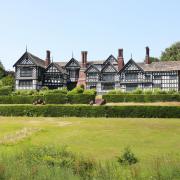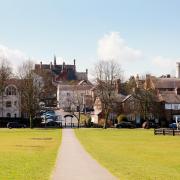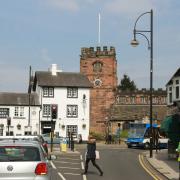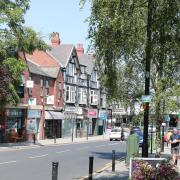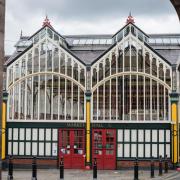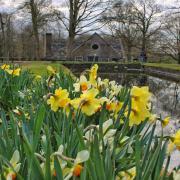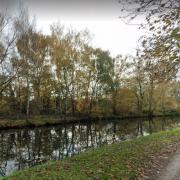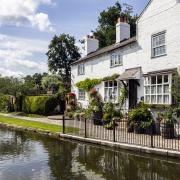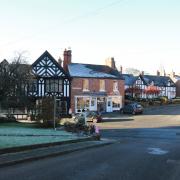We meet experts of the silk trail, as well as people making things happen in other avenues of Macclesfield life
WORDS BY MIKE SMITH PHOTOGRAPHY BY JOHN COCKS
Everyone knows that the Silk Road begins in China, but how many people know where it ends? According to a recent ruling by the UN World Tourism Organisation, this famous route begins in Xi’an, the ancient capital of China, and ends in the ancient Cheshire town of Macclesfield.
To discover why Macclesfield has merited this accolade, I visited the Silk Industry Museum, where curator Annabel Wills showed me exhibits that spin a fascinating historical yarn through the use of archive material, original machinery and hands-on displays.
Annabel said: ‘Production of silk fabrics began in China in 3,500BC, but did not spread to England until the 18th century. In 1773, London weavers won fixed prices for their work, causing the silk merchants to seek lower prices in provincial centres like Macclesfield, where hand-loom weaving in ‘garret houses’ was gradually replaced by weaving in multi-storey mills. Our town became the biggest producer of finished silk goods in the world.’
Annabel’s enthusiasm is matched by the dedication of trustees Val Lloyd and Eric Rogers, who have designed and fitted out the new Jacquard Tea Room. Named after the inventor of the loom that revolutionised silk-weaving, the room is decorated with antique advertisements for Hovis, a product that originated in Macclesfield. Val’s grandmother was one of the child labourers employed in the mills and her commitment to the museum reflects her belief that ‘silk is still the soul of the town’.
Eric is the proud owner of a silk map that was produced in Macclesfield and used by his father, who was a navigator in the Second World War. The room that illustrates the town’s war effort, which included the production of silk parachutes and airmen’s suits, is labelled ‘Top Secret’. Because the work was cocooned in secrecy, Macclesfield was the only mill town in Britain to escape bombing.
The ability of the local people to keep a secret seems to have spilled over into modern times, with the result that Macclesfield has hidden its light under a bushel for far too long. Apart from its silk heritage, the town has a wealth of creative, cultural, entrepreneurial and sporting talent, which a new group called ‘Make It Macclesfield’ is determined to tap into and make known to the wider world.
The group, comprising volunteers representing business, culture and sport, grew out of business breakfasts organised by the local Member of Parliament, David Rutley. It is now chaired by Clare Hayward, a dynamic entrepreneur with a profound belief in Macclesfield’s potential. Clare told me: ‘Our vision is to make the town a warmly regarded destination, both nationally and internationally, and one that is recognised as the national centre for silk, a cultural hub for the North West and an economically affluent town.’
Clare talks enthusiastically about the prospect of new retail and leisure facilities, including a cinema, a hotel and a new theatre and entertainment venue, the Cocoon, which will appropriately, be shaped like a cocoon. Her group is promoting the creation of bars and function facilities in the splendid Town Hall, which is currently undergoing refurbishment, and its members are keen to bring the market place alive with al fresco dining, festivals and events.
Make It Macclesfield is hoping to build on the success of the Barnaby Festival, a popular arts event held in June, and the Treacle Market, an antiques, craft, food and drinks fair organised by Jane Munro and Debbie Quinn. The market is held on the last Sunday of every month and is often accompanied by fun events, from dog shows to conker contests.
Explaining that the market is named after an incident when a horse-drawn wagon overturned and spilt its cargo of treacle, Jane says: ‘We’re giving people the chance to find gorgeous things on Macclesfield’s streets once again. But less sticky things.’
Clare Hayward recognises that Make It Macclesfield is trying to revitalise the town in difficult economic times, but she is encouraged by support from Cheshire East Council’s Local Area Partnership, whose manager, Fiona Seddon, makes every effort to attract sponsorship and grants for the various projects and to harness the energy of people in the voluntary and community sectors.
The contribution made to the community by volunteers is evident in the achievements of Macclesfield Boys’ Boxing Club, where all the coaches give their services for free. The club has over 70 members and three of its female boxers, 14-year-old Courtney Hughes, 15-year-old Beth Campbell and 17-year-old Carys Artingstall, have all become national ABA champions.
Head coach Kevin Bradbury said: ‘Boxing is a great means of turning around troubled lives and giving youngsters confidence. These girls were introduced to the sport by Donna Shaw and what they’ve achieved is fantastic.’
Members of Macclesfield and District Round Table are also on a high after raising �25,000 for a breast-scanner appeal. They are now planning a beer festival, which will be held on the second weekend in May at Macclesfield Rugby Club and should raise a large sum for the Seashell Trust, which supports people with sensory impairment. Round Table’s Nick Thompson said: ‘Our organisation is celebrating its 60th anniversary this year. We’re a group who aim to do some good in the community, while establishing a network of friends who can be called on for help at any time.’
Clare Hayward is about to lead a delegation of volunteers from the Make It Macclesfield group to Xi’an, where discussions will take place on business, travel, educational and cultural exchanges. She talks of encouraging tourists to make the 5,088 mile journey from Xi’an to Macclesfield, where they will be able to experience the silk heritage of the town and the beauty of the countryside and stately homes on its doorstep. Clare is clearly determined to convert the town’s new status as the end of the Silk Road into the beginning of the road to a revitalised Macclesfield.
The print version of this article appeared in the April 2012 issue of Cheshire Life
We can deliver a copy direct to your door – order online here



